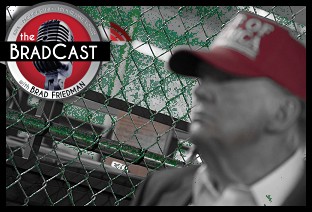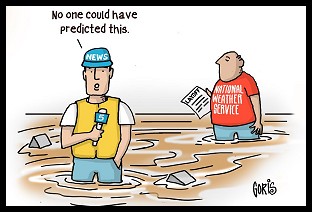Guest blogged by Ernest A. Canning
 New video has emerged (posted below), courtesy of ThinkProgress of an apparently unprovoked Oakland police officer shooting a cameraman during a recent stand-off with Occupy Oakland demonstrators.
New video has emerged (posted below), courtesy of ThinkProgress of an apparently unprovoked Oakland police officer shooting a cameraman during a recent stand-off with Occupy Oakland demonstrators.
In an email to The BRAD BLOG, Sgt. Christopher Bolton, Oakland PD's Chief of Staff, confirmed that the incident involved an "OPD use of force" which took place at 16th Street near San Pablo Ave. in Oakland on the morning of Nov. 3, 2011 and that the matter was "under investigation." (Recall that a general strike took place in Oakland on Nov. 2. This event, per the cameraman, took place shortly after midnight.)
However, Bolton did not directly answer specific follow-up questions designed to pin down details of the incident.
At YouTube, the unidentified cameraman denied that there had been any "violence or confrontation of any kind underway" at the time the OPD officer can be seen aiming and firing (as seen 31 seconds into the 40 second video below.)
Because this potentially involves an unprovoked police assault on a citizen-journalist, the issue at stake entails more than police misconduct. If it was unprovoked battery, the incident reflects nothing less than a direct assault on the First Amendment, democratic accountability and the public's right to monitor police misconduct.
Video captures moment officer fires...
Although the cameraman said he was shot by a rubber bullet, Bolton states that both citizens and reporters have confused "drag stabilized 'bean bags' with 'rubber bullets.'" He says the department does not use rubber bullets.
By itself, the video reveals no threat directed at the officers prior to the moment one of them opens fire. There is nothing in the video to suggest that any objects were being hurled at the police line or that they might have been facing imminent violence. However, as the camera is focused exclusively on the police line, it is, of itself, inconclusive, as the video does not reveal what the crowd may have been doing behind the cameraman.
Both the videographer and anyone else who personally witnessed the event above are invited to contact The BRAD BLOG so as to assist in pinning down the facts to offer a more complete picture of what happened.
Transparency and public accountability
Following up on Bolton's acknowledgment that this incident entailed "OPD use of force," The BRAD BLOG posed the following questions via email:
Did the officer file a written report explaining why he/she shot the cameraman? If so, what was the reason?
Was the incident preceded by a declaration of an unlawful assembly at that location?
Does OPD contend that officers manning the police line at that incident were facing an imminent threat of violence? If so, what is the basis for that claim?
Did OPD film that particular incident?
Please treat this as a public records request for any video that may have been obtained for that incident.
Bolton's only response was that he had "forwarded [our] requests to the City Attorney's Office and OPD Records Division for tracking and response."
This circle the wagons approach comes on the heels of a refusal by the OPD's Chief of Staff to provide information in response to a public records request submitted jointly by the ACLU of Northern California and the National Lawyers Guild pertaining to the Oct. 25 events that disintegrated into a violent confrontation with demonstrators at Occupy Oakland, resulting in serious injuries to, among others, a two-tour Iraq vet.
Last week, The BRAD BLOG published a detailed analysis of the 10/25/11 events leading up to the apparent unprovoked used of tear gas on peaceful demonstrators by the Oakland PD's multi-agency task force. Earlier this week, we reported exclusively on the OPD's walk back of comments made by their Interim Chief Howard Jordan after the incidents. During a television press conference, Jordan had contended that the use of gas "was necessary to protect our officers and protect property around the area and to protect injuries to others as well."
Despite Jordan's claim that night that "we had to deploy gas in order to stop the crowd and people from pelting us with bottles and rocks," no evidence of projectiles from the crowd prior to the use of chemical agents has surfaced. The OPD's spokesman was unable to confirm or deny that the department was in possession of video showing such behavior from demonstrators that night, and The BRAD BLOG's public records request for any such videos in their possession is still pending.
Bolton, the OPD Chief of Staff, however, reiterated his belief in the public's right to know in response to a similar request from the ACLU. His refusal to produce actual information, however, prompted this observation from the ACLU:
Assault on First Amendment right to film police misconduct?
While not directed specifically at this event, a Nov. 8, 2011 Los Angeles Times op-ed by George Washington Univ. Law Prof. Jonathan Turley, on "The right of citizens to videotape police," addressed a broad range of police retaliation when citizens videotape them.
Turley cited a case in which the U.S. First Circuit Court of Appeal ruled that Boston police violated the First Amendment rights of an attorney, whom they had charged with violating the state's wiretap statute when he refused to turn off his cell phone camera while filming three police officers arresting a man in the Boston Common. However, Turley also cited a disturbing remark made by U.S. 7th Circuit Court of Appeal Judge Richard Posner, during oral arguments by an ACLU attorney pertaining to an IL law barring the right to audiotape police officers in public.
Posner, who is affiliated with the ultra-radical right Federalist Society --- as are four of the nine Justices on the U.S. Supreme Court --- said he was "suspicious when the civil liberties people start telling the police how to do their business."
As underscored by our recent coverage of the 10/25/11 melee that critically injured a two tour Iraq Vet, video-taping by citizen journalists is critical in helping to insure that those whose job it is to enforce the law do not themselves violate both it and the rights of citizens whom they have taken an oath to protect and defend.
Like the basic issue of democracy vs. plutocracy, the ability of citizen journalists to film police crowd control activity without fear of arrest, prosecution or serious injury goes to the heart of the very reason for Occupy Wall Street --- the hypocrisy of a two-tiered system of justice that provides impunity to political and economic elites while imposing a harsh criminal code on ordinary citizens.
This is of manifest importance when measured against what Alternet's Nick Turse referred to as the "mini-surveillance state" where police-operated cameras are used to monitor every move citizens make as they exercise their First Amendment right to peaceably assemble and to petition their government for a redress of grievances.
The issue entails the fundamental difference between democratic accountability and the tyranny of a police state.
UPDATE 11/10/11: Alternet’s Joshua Holland identified the cameraman as 30 year old Oakland resident, Scott Campbell. Holland reports that Campbell complied when officers asked him to move back, which explains Campbell’s repeatedly asking police, “Is this ok?”
Ernest A. Canning has been an active member of the California state bar since 1977. Mr. Canning has received both undergraduate and graduate degrees in political science as well as a juris doctor. He is also a Vietnam vet (4th Infantry, Central Highlands 1968). Follow him on Twitter: @Cann4ing.


 Repub Support for Immigrants Skyrockets Amid Trump's Crackdown: 'BradCast' 7/14/25
Repub Support for Immigrants Skyrockets Amid Trump's Crackdown: 'BradCast' 7/14/25  Sunday 'Totally Predictable' Toons
Sunday 'Totally Predictable' Toons Democracy STILL Our Best Way Out of This Mess -- And Repubs Know It: 'BradCast' 7/10/25
Democracy STILL Our Best Way Out of This Mess -- And Repubs Know It: 'BradCast' 7/10/25 'Green News Report' 7/10/25
'Green News Report' 7/10/25
 'Mass Shooter Subsidy'?: More Dumb, Deadly Stuff in Trump's New Law: 'BradCast' 7/9/25
'Mass Shooter Subsidy'?: More Dumb, Deadly Stuff in Trump's New Law: 'BradCast' 7/9/25  Trump's New Law Supersizes ICE, Mass Detention, Militarization: 'BradCast' 7/8/25
Trump's New Law Supersizes ICE, Mass Detention, Militarization: 'BradCast' 7/8/25  'Green News Report' 7/8/25
'Green News Report' 7/8/25 Texas Flooding Tragedy Was Both Predictable and Predicted: 'BradCast' 7/7/25
Texas Flooding Tragedy Was Both Predictable and Predicted: 'BradCast' 7/7/25 Sunday 'Big Billionaire Bonanza' Toons
Sunday 'Big Billionaire Bonanza' Toons Sunday 'Total Obliteration' Toons
Sunday 'Total Obliteration' Toons 'Green News Report' 6/26/25
'Green News Report' 6/26/25 Thank You For Your Attention to This Matter:
Thank You For Your Attention to This Matter: Mamdani Primary 'Win' Augurs New Era of Rising Progressives: 'BradCast' 6/25/25
Mamdani Primary 'Win' Augurs New Era of Rising Progressives: 'BradCast' 6/25/25 U.S. Authoritarianism Under-way (But We're Still Here to Fight It): 'BradCast' 6/24/25
U.S. Authoritarianism Under-way (But We're Still Here to Fight It): 'BradCast' 6/24/25 'Anti-War' Trump Attacks Iran on False Claims About WMD: 'BradCast' 6/23/25
'Anti-War' Trump Attacks Iran on False Claims About WMD: 'BradCast' 6/23/25 Senate Health Care Cuts 'More Extreme' Than House Version: 'BradCast' 6/19/25
Senate Health Care Cuts 'More Extreme' Than House Version: 'BradCast' 6/19/25 What 'Anti-War President'? MAGA Civil War Over Trump, Iran: 'BradCast' 6/18/25
What 'Anti-War President'? MAGA Civil War Over Trump, Iran: 'BradCast' 6/18/25 Trump's 'Remigration' is Code for 'Ethnic Cleansing': 'BradCast' 6/17/25
Trump's 'Remigration' is Code for 'Ethnic Cleansing': 'BradCast' 6/17/25 Last Weekend Today: 'BradCast' 6/16/25
Last Weekend Today: 'BradCast' 6/16/25
 VA GOP VOTER REG FRAUDSTER OFF HOOK
VA GOP VOTER REG FRAUDSTER OFF HOOK Criminal GOP Voter Registration Fraud Probe Expanding in VA
Criminal GOP Voter Registration Fraud Probe Expanding in VA DOJ PROBE SOUGHT AFTER VA ARREST
DOJ PROBE SOUGHT AFTER VA ARREST Arrest in VA: GOP Voter Reg Scandal Widens
Arrest in VA: GOP Voter Reg Scandal Widens ALL TOGETHER: ROVE, SPROUL, KOCHS, RNC
ALL TOGETHER: ROVE, SPROUL, KOCHS, RNC LATimes: RNC's 'Fired' Sproul Working for Repubs in 'as Many as 30 States'
LATimes: RNC's 'Fired' Sproul Working for Repubs in 'as Many as 30 States' 'Fired' Sproul Group 'Cloned', Still Working for Republicans in At Least 10 States
'Fired' Sproul Group 'Cloned', Still Working for Republicans in At Least 10 States FINALLY: FOX ON GOP REG FRAUD SCANDAL
FINALLY: FOX ON GOP REG FRAUD SCANDAL COLORADO FOLLOWS FLORIDA WITH GOP CRIMINAL INVESTIGATION
COLORADO FOLLOWS FLORIDA WITH GOP CRIMINAL INVESTIGATION CRIMINAL PROBE LAUNCHED INTO GOP VOTER REGISTRATION FRAUD SCANDAL IN FL
CRIMINAL PROBE LAUNCHED INTO GOP VOTER REGISTRATION FRAUD SCANDAL IN FL Brad Breaks PA Photo ID & GOP Registration Fraud Scandal News on Hartmann TV
Brad Breaks PA Photo ID & GOP Registration Fraud Scandal News on Hartmann TV  CAUGHT ON TAPE: COORDINATED NATIONWIDE GOP VOTER REG SCAM
CAUGHT ON TAPE: COORDINATED NATIONWIDE GOP VOTER REG SCAM CRIMINAL ELECTION FRAUD COMPLAINT FILED AGAINST GOP 'FRAUD' FIRM
CRIMINAL ELECTION FRAUD COMPLAINT FILED AGAINST GOP 'FRAUD' FIRM RICK SCOTT GETS ROLLED IN GOP REGISTRATION FRAUD SCANDAL
RICK SCOTT GETS ROLLED IN GOP REGISTRATION FRAUD SCANDAL VIDEO: Brad Breaks GOP Reg Fraud Scandal on Hartmann TV
VIDEO: Brad Breaks GOP Reg Fraud Scandal on Hartmann TV RNC FIRES NATIONAL VOTER REGISTRATION FIRM FOR FRAUD
RNC FIRES NATIONAL VOTER REGISTRATION FIRM FOR FRAUD EXCLUSIVE: Intvw w/ FL Official Who First Discovered GOP Reg Fraud
EXCLUSIVE: Intvw w/ FL Official Who First Discovered GOP Reg Fraud GOP REGISTRATION FRAUD FOUND IN FL
GOP REGISTRATION FRAUD FOUND IN FL

































